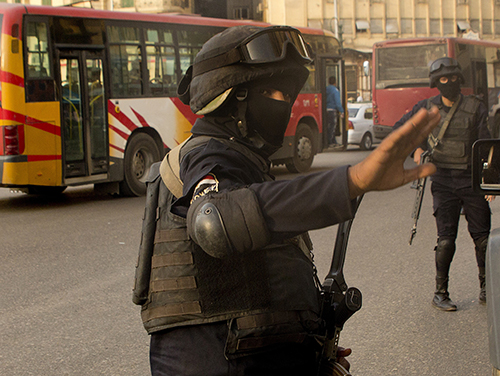Four journalists were detained November 11 amid a heavy deployment of security forces in Egypt’s cities in response to calls for nationwide protests over economic reforms. The protests were fewer and smaller than anticipated, but journalists were still harassed and, in some cases, arrested, according to local and international media. One journalist remains in custody. Separately, a gag order on an investigation into the funding of civil society organizations remains in place, and courts are due to hear two criminal defamation cases brought by public officials against reporters.
Friday protest arrests
Photojournalist Abdelrahman Taher was arrested November 11 while covering a march in Haram, in the Giza district that borders Cairo. Taher appeared before homeland security prosecutors the following day, and state prosecutors on November 13, according to local press freedom groups and news reports. State prosecutors charged Taher with belonging to a terrorist group, participating in an illegal protest, and obstructing traffic.
Taher was previously arrested in February 2015 and held in pre-trial detention for almost a year on charges of protesting, according to press freedom groups. He was released from custody in January 2016, with charges still pending. At the time of his latest arrest Taher was covering the Friday marches for the website, Al Sahm News, according to statements by the Journalists’ Syndicate, the official union for the Egyptian press.
At least three other journalists were detained the same day. Hesham Mohamed, who works for the newspaper al-Watan, was detained for an hour after photographing marches in Haram after Friday prayers, according to local reports.
Ahmed Lotfy Sayyed, who works for the news website Masrawy was detained for an hour and a half after taking photographs of empty streets around Tahrir Square, he told the press freedom group Journalists Against Torture Observatory.
Editor Karima Hassan was also detained while covering Tahrir, according to her outlet, Al-Masry Al-Youm. She was stopped by police after photographing a small group of people chanting in support of the security forces and the Egyptian government. Police held Hassan in a residential building in the square, then took her to a police van, where an officer questioned Hassan and went through her phone and tablet before releasing her.
The Journalists’ Syndicate appealed to the Ministry of Interior on behalf of Sayyed, Mohamed, and Taher to secure their release, according to news reports.
Gag order remains in place
An administrative court decided November 8 that it was not within its jurisdiction to rule in a case seeking to end a media gag order of an investigation into foreign funding of human rights organizations, according to news reports. The investigation, which dates back to 2011, was re-opened in March 2016, leading to an outcry by local and international civil society. The order, issued in March by the head of the judicial committee investigating the case, prohibits the publishing of any details of the investigation, except for official statements issued by the committee.
Journalists in court
On November 10, a Cairo criminal court heard a defamation suit brought by Major General Ibrahim Abdel-Atti against journalists at the weekly Sawt al-Ummah, according to news reports. The complaint was brought over an article published in the paper in May 2014 about a set of devices that Abdel-Atti and other military officials claimed were able to detect and cure Hepatitis C, AIDS, and other illnesses. Abdel-Atti is suing Antar Abdellatif, who wrote the article, and Sawt al-Ummah’s editor-in-chief Abdelhalim Kandil over claims that the article harmed his reputation and carried false information, according to reports. If convicted, the journalists could face prison sentences and heavy fines. The next court hearing is due to be held December 4.
In a separate case, two journalists and an executive editor at the privately owned newspaper al-Bawaba were referred to criminal court November 12, on charges of insulting the office of the public prosecutor. The charges date back to al-Bawaba’s coverage of remarks made by former Minister of Culture Gaber Asfour at a freedom of expression conference in March 2016. The Supreme Judicial Council, which includes the Public Prosecutor, claimed that Asfour’s remarks were insulting to the public prosecutor’s office, according to statements by al-Bawaba executive editor Mohamed al-Baz. Asfour is indicted in the case alongside journalists Nidal Mamdouh and Mohamed Hamdy Abu Saad.
Al-Baz, Mamdouh, and Abu Saad face an additional charge of falsely assuming the identity of journalists because they are not members of the Journalists’ Syndicate, according to local press freedom groups. Membership to the syndicate is not compulsory for Egyptian journalists.
CPJ could not determine when the next hearing is scheduled to take place.
